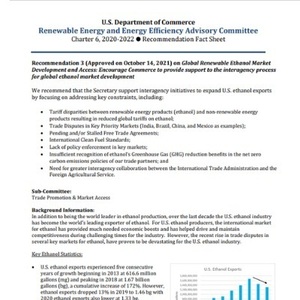USGC: REEAC makes recommendations on ethanol market development

January 14, 2022
BY U.S. Grains Council
Before the end of 2021, the U.S. Department of Commerce’s Renewable Energy and Energy Efficiency Advisory Committee (REEEAC) released its updated recommendation fact sheet, aiming to encourage the department to provide support to the interagency process for global ethanol market development.
The committee, including the U.S. Grains Council’s Director of Global Ethanol Market Development Brian Healy, has recommended the Secretary of Commerce focus on the following key constraints to expand U.S. ethanol exports:
– Tariff disparities between renewable energy products (ethanol) and non-renewable energy products resulting in reduced global tariffs on ethanol;
– Trade disputes in key priority markets;
– International clean fuel standards;
Advertisement
– Lack of policy enforcement in key markets;
– Greater recognition of ethanol’s greenhouse gas (GHG) reduction benefits; and
– Greater interagency collaboration between the International Trade Administration (ITA) and the Foreign Agricultural Service (FAS).
“These recommendations, approved by the entire REEEAC, reinforce the need for ongoing interagency collaboration on ethanol market development,” Healy said. “We have seen tariff barriers, lack of policy enforcement and other challenges overcome through collaboration and the committee recognizes that value.”
If the key constraints are given the proper attention, REEEAC expects global ethanol trade to expand by making the global landscape more competitive.
Advertisement
Additionally, the committee has created six indicators of success following the implementation of its recommendations, including eliminating tariff disparity between energy products; eliminating the fuel ethanol import ban in India; returning tariffs on ethanol to historic low rates; ensuring policy enforcement for ethanol use in international markets like India and Nigeria; offering promotional workshops that support the narrative of ethanol as a mechanism to support countries in meeting their net zero carbon emission objectives; and establishing a working group on bioenergy trade issues between the ITA and FAS.
As a commodity supported by the Council, USGC will continue to monitor the progress of REEEAC’s recommendations, while working on the ground in ethanol markets around the world to showcase the benefits of ethanol.
“This has been an extremely successful charter of the REEEAC for the industry as a whole,” Healy said. “The public private partnership remains critical in advancing the competitiveness and benefits of ethanol.”
Related Stories
The U.S. EPA on July 8 hosted virtual public hearing to gather input on the agency’s recently released proposed rule to set 2026 and 2027 RFS RVOs. Members of the biofuel industry were among those to offer testimony during the event.
The U.S. exported 31,160.5 metric tons of biodiesel and biodiesel blends of B30 and greater in May, according to data released by the USDA Foreign Agricultural Service on July 3. Biodiesel imports were 2,226.2 metric tons for the month.
The USDA’s Risk Management Agency is implementing multiple changes to the Camelina pilot insurance program for the 2026 and succeeding crop years. The changes will expand coverage options and provide greater flexibility for producers.
President Trump on July 4 signed the “One Big Beautiful Bill Act.” The legislation extends and updates the 45Z credit and revives a tax credit benefiting small biodiesel producers but repeals several other bioenergy-related tax incentives.
CARB on June 27 announced amendments to the state’s LCFS regulations will take effect beginning on July 1. The amended regulations were approved by the agency in November 2024, but implementation was delayed due to regulatory clarity issues.
Upcoming Events










